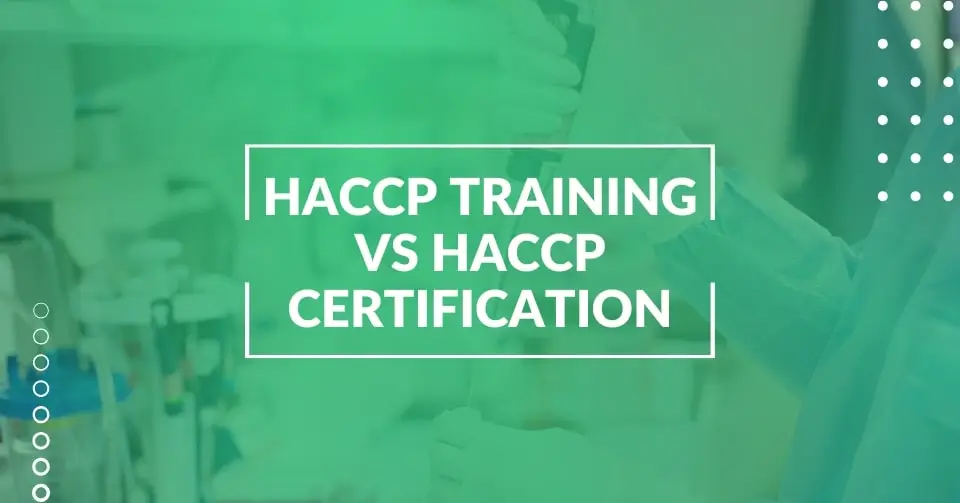At FoodReady, we frequently receive inquiries from diverse individuals within the food industry. These include food manufacturers striving for operational excellence, diligent Quality Assurance (QA) managers dedicated to upholding the highest safety standards, and ambitious small business owners meticulously preparing for rigorous audits or embarking on the crucial journey of implementing robust Hazard Analysis and Critical Control Points (HACCP) plans.
A common and fundamental question that consistently arises during these interactions is: “What is the essential requirement for my situation: HACCP training or certification?”
While both HACCP training and certification aim to instill a comprehensive understanding of the fundamental principles underpinning Hazard Analysis and Critical Control Points (a critical food safety management system), the core distinctions lie in several key aspects. The key differences between HACCP training and certification come down to how much you learn, how your understanding is tested, and how widely recognized and accepted each one is in the food industry.
Ultimately, the purpose of this blog is to guide you in determining which of these pathways – HACCP training or HACCP certification – is the most appropriate and beneficial fit for your specific team’s needs, your establishment’s operational requirements, and the unique characteristics of your food processing facility.
What is a HACCP Training?
HACCP training is a structured educational program teaching food safety professionals how to apply the Hazard Analysis and Critical Control Points (HACCP) system. It covers hazard identification, evaluation, and control to minimize foodborne illness risks.
Standard training includes: an introduction to food safety hazards; a detailed understanding of biological, chemical, and physical risks (exploring their nature, sources, and control); a thorough explanation of the 7 HACCP principles (hazard analysis, CCP determination, critical limits establishment, monitoring, corrective actions, verification, and record-keeping); and practical guidance on developing and implementing a basic HACCP plan (forming a team, product description, flow diagrams, applying principles, and documentation).
If you’re curious what HACCP training looks like in practice, check out Saro Loucks’ detailed account of her hands-on training experience and how it shaped her understanding of food safety.
Target Audience for HACCP Training:
HACCP training is essential for a wide range of individuals involved in the food industry to ensure a collective commitment to food safety:
Front-line Production Employees: HACCP training benefits individuals directly involved in handling, processing, and packaging food products. It equips them with the awareness and understanding to identify and prevent potential hazards during their daily tasks.
QA/QC Technicians: Quality Assurance and Quality Control technicians are critical in monitoring and verifying food safety standards. HACCP training provides them with the necessary knowledge of hazards, CCPs, and monitoring procedures to perform their duties effectively.
Supervisors and Food Handlers: Supervisors oversee food safety practices within their teams, and all food handlers must understand basic food safety principles. HACCP training provides them with the knowledge to implement and enforce safe food handling procedures.
New Hires Needing Food Safety Onboarding: HACCP training is a very important component of the onboarding process for new employees in the food industry. It ensures that they have a basic understanding of food safety principles and, very importantly, how to maintain these standards.
Important Considerations Regarding HACCP Training and Official Documentation:
Recognizing the distinction between general HACCP training and formal HACCP certification is crucial. While HACCP training is undoubtedly informative and enhances food safety knowledge, unless it culminates in a formal examination and certification issued by an accredited organization, it may not be officially recognized as sufficient documentation during regulatory audits or by specific customers who require certified HACCP systems.
For official recognition, businesses often need to pursue HACCP certification through a recognized certifying body, which typically involves a more rigorous assessment of their implemented HACCP plan and adherence to established standards. Therefore, while training is a necessary first step, businesses seeking formal recognition of their HACCP system should explore accredited certification options.
What Is a HACCP Certification Course?
A HACCP certification course includes in-depth training plus examination, resulting in a certificate issued by a recognized authority. This certificate is often required for regulatory compliance or third-party audits.
Certification is typically provided by:
- International HACCP Alliance-accredited programs
- NSF or other accredited third-party training providers
- GFSI-aligned certification bodies (for SQF, BRCGS, FSSC 22000, etc.)
Who Needs HACCP Certification?
HACCP certification benefits food industry professionals in food safety and quality assurance roles. It demonstrates a strong understanding of the HACCP food safety system and the competence to implement it properly.
Key individuals and groups who typically need or benefit significantly from HACCP certification include:
QA or Food Safety Managers: Professionals responsible for creating, implementing and maintaining food safety programs within a company benefit from HACCP certification. This certification provides them with the comprehensive knowledge and abilities required to effectively manage these essential functions, guarantee regulatory compliance and industry best practices. They use HACCP principles to identify and control potential hazards throughout the food production process proactively. This also includes Production Managers and Production Supervisors as these personnel are directly involved in and responsible for manufacturing a safe food product for consumption.
Managing Directors & Owners: For food business owners and HACCP team leaders, getting HACCP certified is really important. Since they’re the ones ultimately in charge of making sure food is safe, this certification gives them the deep understanding they need to create and put effective HACCP plans in place. They’ll learn how to spot risks, figure out what could go wrong, set up important checkpoints, make good decisions, and lead their teams in keeping food safety top-notch.
Food Establishments & Food Manufacturers: If a food facility is getting ready for an audit, having certified people on staff, especially those handling the HACCP system, sends a strong message that they take food safety seriously. This can definitely lead to better audit results because the auditors know there’s expertise in place to properly manage a HACCP plan. It can also make the audit process smoother and boost trust in the facility’s safety measures.
From HACCP Basics to Certification, We’ve Got You Covered
Get matched with the right resources for your role and your facility’s goals. Training or certification? We’ll help you figure it out.
Training vs. Certification: A Quick Comparison
It is important to note that many of our FoodReady clients pursuing audit readiness or aiming to meet FSMA/USDA/FDA standards have to show proof of formal HACCP certification to the auditor to prevent critical non-conformances.
Let’s take a look at the comparison below to put our notes into perspective.
| Feature | HACCP Training | HACCP Certification |
| Purpose | Build HACCP knowledge | Validate HACCP competency |
| Includes Exam? | Sometimes, but not always | Yes – mandatory for certification |
| Credential Issued | Certificate of attendance/completion | Recognized certification (e.g., IHA) |
| Regulatory Use | Limited – for education | Widely accepted for compliance/audits |
| Best For | General staff and food safety teams | Leadership, auditors, and compliance roles |
How FoodReady Can Help?
FoodReady assists with more than creating the HACCP plan. We provide comprehensive support for the entire audit and compliance journey. Our digital platform offers AI HACCP plan builder, access to certified training partners, and connections to trusted certification providers. FoodReady aims to help businesses of all sizes streamline HACCP implementation and achieve their food safety goals through flexible in-app tools and expert support, fostering a strong food safety culture. So there it is, your HACCP Training done and dusted with FoodReady’s expert guidance!
Also, remember that we’ve worked with many top-performing food businesses to streamline their HACCP implementation. We can connect you with trusted certification providers who can guide you through our in-app food safety tools while you obtain an external HACCP Certification.
Conclusion
Finally, let us provide a clear differentiation between these HACCP functions that we have discussed.
HACCP training equips individuals with powerful knowledge to develop and implement food safety systems, focusing on the seven HACCP principles and hazard control. HACCP certification is an external audit validating a business’s HACCP system against standards like SQF and GFSI, ensuring compliance and demonstrating food safety commitment. Training provides HACCP’s ‘how’ and ‘why’, while certification offers proof of meeting standards. Training is foundational, while certification is an external validation; both are often interdependent and crucial for a robust food safety program. The need for either training or certification depends on regulations, customer requirements, and business goals, with both holding their weight in forming critical cornerstones of a food establishment of any size.







